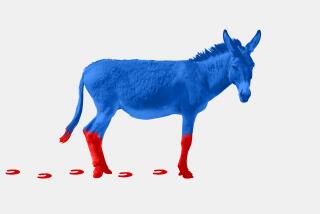Clinton Sees Sunny Prospects in Florida : President’s message is getting a warm response in a state that usually belongs to the Republicans.
- Share via
SUNRISE, Fla. — For the past four presidential elections, Florida has been a state where Democratic candidates showed up only in hopes of forcing the GOP to spend time and money sewing up an expected victory.
This year it’s different.
In a telling sign of his strength nationwide, President Clinton arrived here Thursday for two days of campaigning with aides insisting they’re fighting to win--and political experts and GOP officials for once taking them at their word.
“I think they’re for real this time,” said Robert Joffe of the Mason-Dixon polling firm in Miami. “It’s very much up for grabs.”
Although the nation’s fourth-largest state has been turning ever more Republican, the White House smells opportunity in 1996 because of a series of special circumstances, coupled with some advantages showing up for Clinton nationwide. Officials of both parties say their internal polling shows Clinton is currently leading in the state by about 5 or 6 percentage points.
Florida still has a disproportionate concentration of retirees, and they have responded strongly to Clinton’s arguments that he would protect Medicare and Medicaid against the inroads of the Republican Congress.
Using two new ideas, Clinton went at them again Thursday afternoon in this Miami suburb: He proposed to create a commission to scrutinize the cost and quality of managed-care insurance systems. He also said he would support legislation to end the “gag rules” imposed by some health maintenance organizations that prevent doctors from telling patients about more expensive alternative treatments or referrals.
Clinton has also been scoring with the environmental arguments he has been aiming at Floridians, many of whom came here from the North for the quality of life.
Clinton showed his appreciation of the issue at the Democratic convention, when he worked in a mention of his support for preservation of the “precious” Everglades. And he got a standing ovation in his comments at the Sunrise Musical Theater on Thursday, when he expressed hope that the country could “complete the work of saving the Florida Everglades” in the next four years.
As elsewhere, Clinton is racking up strong support from women, many in swing suburban precincts, thanks to such issues as abortion rights and his support for greater federal aid to education. Florida is showing a yawning gender gap.
And, finally, the president is softening up traditionally Republican Cuban American voters, who have been upset by the decision of congressional Republicans to include in this year’s welfare reform bill a provision that would end most aid to legal immigrants. Clinton opposed that provision and has promised to push for changing the measure.
While the bulk of Cuban Americans are citizens, a large number of elderly Cuban Americans have remained resident aliens--in part because of difficulties learning English. They now face the prospect of losing Medicaid benefits for nursing home care as well as support from other federal programs.
Clinton also gained ground with Cuban Americans last spring by signing the Helms-Burton Act, aimed at punishing multinational companies that do business with Cuba.
While Clinton still may not win a majority of Cuban American votes, he will be helped greatly if their coolness toward the GOP reduces their traditionally heavy turnout at the polls. Cuban Americans make up 7% of the Florida electorate, but their interest in politics is such that they have sometimes had nearly 100% turnout in some precincts, Joffe said.
Clinton’s crime-fighting proposals, including his initiative to add 100,000 police officers, have also meshed with the hard-line anti-crime stance seen in the state. Survey find that Florida voters are among the nation’s strongest supporters of the death penalty--reflecting the mix of Southerners and elderly retirees in the state’s population.
State GOP leaders have lobbied hard to bring presidential candidate Bob Dole back for more visits to the state. He is scheduled to return next week, with a visit to Tampa.
Clinton, meanwhile, has already visited the state four times this year, an unusual number for a Democratic candidate even though two visits were principally for fund-raising. He would have come a fifth time, in July, but for Hurricane Bertha.
In 1988, Democratic nominee Michael S. Dukakis didn’t visit the state once.
The Democrats’ hopes for Florida are also shown by the fact that they had spent $3 million in early August--before the Republican convention--buying advertising in the state’s 14 media markets.
The White House argues that Democrats have a promising future in the state, noting that Clinton was within 2 percentage points of President Bush in 1992.
Others think the demographics are changing in ways that are likely to hurt the Democrats in the future. Joffe says Florida is filling up with younger, more upwardly mobile suburbanites who lean Republican, while the older ethnic voters who retired to Florida are dying off.
Democratic registration has edged down from 51% in 1992 to 46% in August, while GOP registration has held steady at 41%.
Still, Joffe acknowledges that this time around the Democrats have an unforeseen strength in the kind of carefully-tailored appeal Clinton is making.
And Clinton’s comments on Thursday were well designed for Florida, where the elderly have been jolted by the advent of managed health care and shocked by the financial scandals that have overtaken a number of the state’s HMOs.
While insisting that managed-care plans can offer top quality and low cost, Clinton said the country needs to extend “consumer protection” to the 140 million Americans now enrolled in some form of these systems.
He said he supported legislation to end the “gag rules” because “too often, too many health care plans are literally gagging their doctors” by prohibiting them from telling patients about treatments that might be better but would cost more.
Such legislation has already been introduced by Reps. Edward J. Markey (D-Mass.) and Greg Ganske (R-Iowa).
Clinton said the goal of the new advisory commission was to “evaluate the ways that health plans can best serve their customers over the long run, so we can have a health care system we can afford and . . . we can be proud of.”
The panel will have 20 members, including people representing health professionals, insurers, labor, consumers and government. It will be co-chaired by the secretaries of labor and health and human services, and is to deliver its first report in one year.
Times staff writers John M. Broder and Ronald Brownstein in Washington contributed to this story.
(BEGIN TEXT OF INFOBOX / INFOGRAPHIC)
History’s on Clinton’s Side
Republican presidential nominee Bob Dole trails President Clinton by 17 points in the most recent Gallup survey. If history is any indicator, Clinton is in good shape to recapture the White House on Nov. 5. Since 1936, only two candidates--John F. Kennedy and Harry S. Truman--have won after being behind in the first week of September.
*--*
SEPTEMBER WINNING YEAR WINNER MARGIN MARGIN 1996 ??? Clinton +17 ??? 1992 Clinton +9 +6 1988 Bush +8 +7 1984 Reagan +19 +18 1980 Reagan TIED +10 1976 Carter +11 +2 1972 Nixon +28 +23 1968 Nixon +12 +0.7 1964 Johnson +28 +22 1960 Kennedy -1 +0.2 1956 Eisenhower +11 +15 1952 Eisenhower +15 +11 1948 Truman -8 +5 1944 Roosevelt +2 +7 1940 Roosevelt +9 +10 1936 Roosevelt +4 +22
*--*
Source: Gallup surveys
More to Read
Get the L.A. Times Politics newsletter
Deeply reported insights into legislation, politics and policy from Sacramento, Washington and beyond. In your inbox twice per week.
You may occasionally receive promotional content from the Los Angeles Times.











